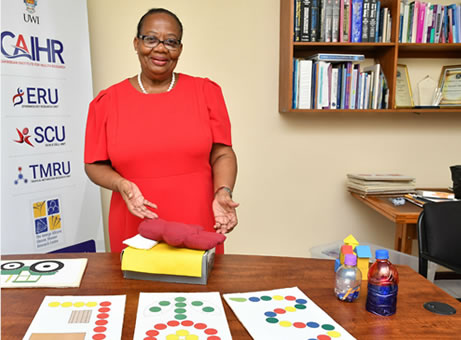Chronic Disease Group
ERU's contribution in providing current data on prevalence and risk factors for Chronic Disease, by producing national health and lifestyle surveys over the past two decades, has been of tremendous value to Jamaica, informing policy towards control of the NCD epidemic including decisions on National Health Fund subsidies as well as allowed the country to achieve its international reporting guidelines. The Unit conducts research that evaluates the impact of existing policies and interventions and seek to make recommendations to strengthen delivery of care, improve outcomes and ultimately reduce mortality among persons with NCDs.
Training
The ERU offers training programmes in Epidemiology including the MSc and PhD degrees and the Postgraduate Diploma in Health Research and Epidemiology.
Faculty Members
- Nadia Bennett
- Trevor Ferguson
- Ishtar Govia
- Marshall Tulloch-Reid
Research
Research evidencing the Unit’s commitment to pushing the envelope of research innovation and Intervention.
The LIFE Project, a 8000 person island-wide cohort study funded by the National Institutes of Health (USA) to examine risk factors for chronic diseases including diabetes hypertension, cardiovascular disease and cancer. This is the largest cohort study to date in Jamaica and the findings will help inform risk factors for chronic diseases in the African diaspora though comparison with US-based and other cohort studies of Black populations.
The Caribbean and South America Teach Based Strategy to Control Hypertension (CATCH) study was funded by the NIH under the GACD initiative to focus on building a team based approach using the best evidence to help patients in Columbia and Jamaica to improve blood pressure control. Hypertension is a major risk factor for many important health conditions including stroke, heart disease, kidney failure and dementia and lower blood pressures help to reduce this risk.
Research Partners
Ministry of Health and Wellness: Improving our understanding of dietary salt intake at a population level.
Harvard T.H. Chan School of Public Health Lown Scholars Program Award: Examining cardiovascular health in urban populations
Global Health through the STRIDE project investigating global issues in dementia
Fox Chase Cancer Center African American Cancer Consortium to build research capacity
NCD risk factor Collaboration to understand risk factors for these conditions through data sharing and the Regional Centre for Research Excellence in Cardiometabolic Disease and Cancer
The UWI Department of Community Health and Psychiatry




